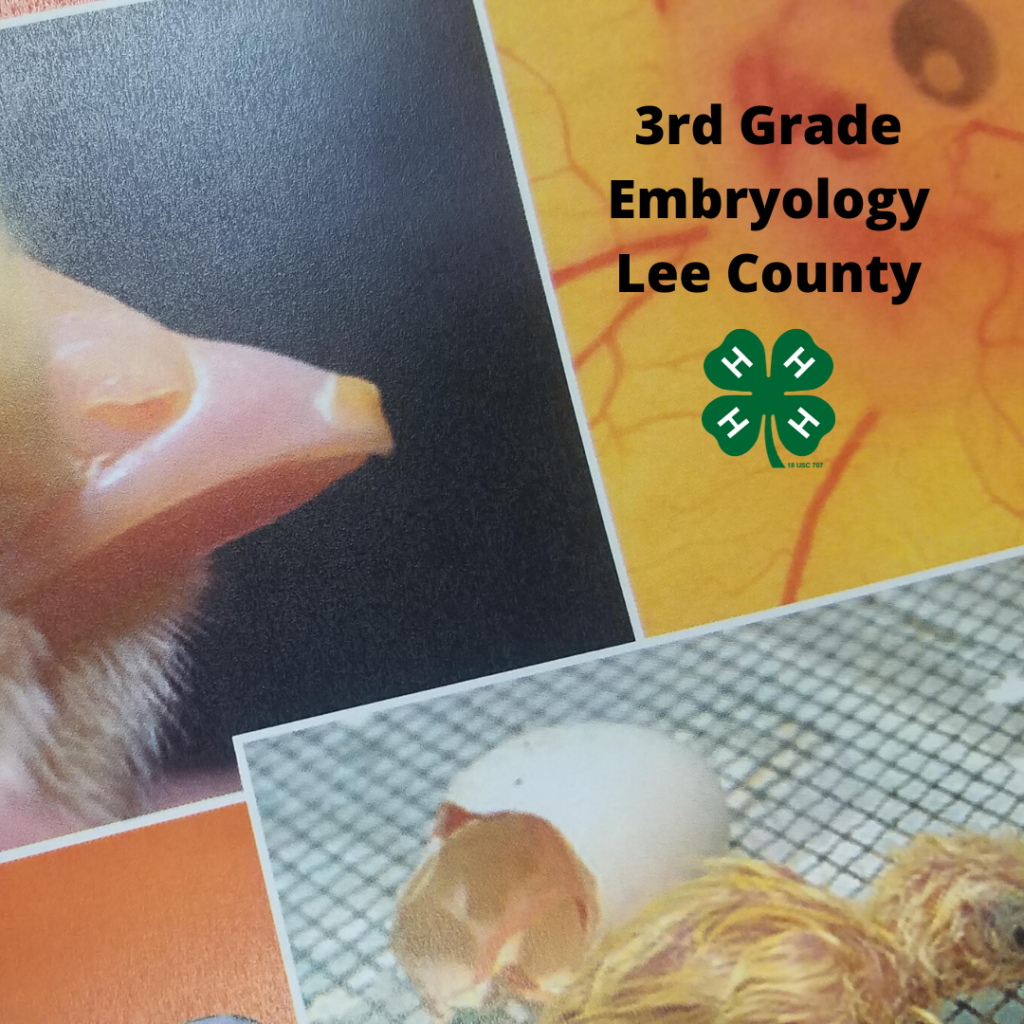Lee County 4-H 3rd Grade Embryology Program
go.ncsu.edu/readext?656163
en Español / em Português
El inglés es el idioma de control de esta página. En la medida en que haya algún conflicto entre la traducción al inglés y la traducción, el inglés prevalece.
Al hacer clic en el enlace de traducción se activa un servicio de traducción gratuito para convertir la página al español. Al igual que con cualquier traducción por Internet, la conversión no es sensible al contexto y puede que no traduzca el texto en su significado original. NC State Extension no garantiza la exactitud del texto traducido. Por favor, tenga en cuenta que algunas aplicaciones y/o servicios pueden no funcionar como se espera cuando se traducen.
Português
Inglês é o idioma de controle desta página. Na medida que haja algum conflito entre o texto original em Inglês e a tradução, o Inglês prevalece.
Ao clicar no link de tradução, um serviço gratuito de tradução será ativado para converter a página para o Português. Como em qualquer tradução pela internet, a conversão não é sensivel ao contexto e pode não ocorrer a tradução para o significado orginal. O serviço de Extensão da Carolina do Norte (NC State Extension) não garante a exatidão do texto traduzido. Por favor, observe que algumas funções ou serviços podem não funcionar como esperado após a tradução.
English
English is the controlling language of this page. To the extent there is any conflict between the English text and the translation, English controls.
Clicking on the translation link activates a free translation service to convert the page to Spanish. As with any Internet translation, the conversion is not context-sensitive and may not translate the text to its original meaning. NC State Extension does not guarantee the accuracy of the translated text. Please note that some applications and/or services may not function as expected when translated.
Collapse ▲PROGRAM OVERVIEW
4-H Embryology School Enrichment is a program offered through Lee County 4-H and the North Carolina Cooperative Extension. The mission of 4-H Embryology School Enrichment program is to provide high quality experiential learning opportunities. The 4-H Embryology School Enrichment Program addresses many of the Public Schools 3rd grade science and math competency-based curriculum objectives.
PROGRAM OBJECTIVES
- Increase student knowledge through hands on learning opportunities in areas of science and math
- Provide experiential learning in the incubation, hatching and brooding of chicks
- Students will demonstrate skills and knowledge mastered from this experience
METHODOLOGY AND EVALUATION
Trained teachers will facilitate the 4-H Embryology Program in third-grade classrooms. Instructions will be given on pre-hatch, incubation and post-hatch procedures during the scheduled training session on April 19, 2022 @ 4:00 p.m. Third-grade students will study the formation, early growth, and development of chicken in their eggs. If your classroom intends to do live hatching, you will receive chicken eggs, an incubator, a teacher’s curriculum, and a thermometer. Within 48 hours after hatching, the birds will be collected. An evaluation will also be given to help determine the benefits of the program.
EMBRYOLOGY TRAINING and EGG PICK-UP DATE:
The Embryology Training will be held on April 19, 2022 @ 4:00 p.m. via Zoom. The training is free of charge, and each educator will receive all of the necessary information and supplies to complete the program successfully. Supplies pick-up will occur at N.C. Cooperative Extension, Lee County Center @ 4:30. Please call 775-5624 to register for the project or use the online form. We look forward to working with everyone in 2021 and hope to see you at the training!
A CLASSROOM UNIT IN EMBRYOLOGY WILL HELP YOU MEET THE FOLLOWING NATIONAL SCIENCE STANDARDS
Conduct scientific inquiry, Ask questions about objects, organisms, and events in the environment, Plan and conduct a simple investigation, Use simple equipment and tools to gather data, Use data to construct a reasonable explanation, Communicate investigations and explanations, The characteristics of organisms, Organisms have basic needs. Organisms can survive only in environments in which their needs can be met, Each animal has different structures that serve different functions in growth, survival, and reproduction, The behavior of individual organisms is influenced by internal cues and by external cues, Life cycles of organisms, Animals have life cycles including birth, maturation, reproduction and death, Animals closely resemble their parents, Organisms and their environments, All animals depend on plants, Some animals eat plants for food. Other animals eat animals that eat plants, An organism’s patterns of behavior are related to the nature of that organism’s environment, including the kinds and numbers of other organisms present, the availability of food, resources, and the physical characteristics of the environment, Abilities of technological design Identify a simple problem, Propose a solution, Implement proposed solutions, Evaluate a product or design, Communicate a problem, design and solution.





